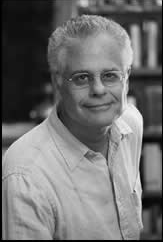"It is generally agreed that Kafka suffered from clinical depression and social anxiety throughout his entire life," writes Kafka scholar Mauro Nervi about the Czech writer. Kafka was often verbally abused by his father, yet he remained in the same house as his father for a good part of his life. A life-long hypochondriac, Kafka's fears became a reality when at age 34 he was diagnosed with tuberculosis. Not long after the diagnosis, according to Nervi, Kafka slipped into a mild depression and broke his second engagement to Felice Bauer, who would marry another man two years later. Nervi writes, "She had loved Kafka, but could not endure his depressions and manic episodes any longer."
Kafka's Antidotes: Franz Kafka's father believed that his son improved after he received his law degree and while he worked briefly for an insurance company. Work certainly did give Kafka material for his novels about the absurdity and misery of bureaucracy, and his writing was a significant antidote for his depression. Exercise was also an important antidote, and Nervi tells us that Kafka was "an accomplished swimmer, enjoyed hiking in the mountains, and was a talented horseman." Throughout his adult life, Kafka communicated frequently and vacationed with his three younger sisters who provided Franz with great support. Near the end of his life, Kafka found a new companion, Dora Dymant, and Nervi believes, "It is possible Dora and Franz were in love," and this loving relationship appears to have been very helpful for Kafka as his body deteriorated due to illness.
Siddhartha Gautama/Buddha (563 BCE - 483 BCE)
Before becoming the Buddha, he was Siddhartha Gautama. According to traditional biography, he was born into royalty, his father a king who attempted to shield Siddhartha from knowledge of human suffering by removing the sick, aged and other suffering from his view. However, Siddhartha was said to have seen an old man, a diseased man, a decaying corpse, and other suffering, and then to have become deeply depressed by these sights. And at age 29, he began his journey to seek wisdom as to how to overcome suffering and despair. His spiritual journey took six years, with Siddhartha ultimately rejecting popular "treatments" of his day that included asceticism, deprivation, and self-mortification.
Siddharta's Antidotes: At age 35, after 49 days of meditating under the Bodhi tree, he attained Enlightenment and became known as Buddha, the "Awakened One," and one of the world's greatest antidotes to the suffering of depression was born. Buddhism begins with understanding truths about suffering. Specifically Buddhism's Four Noble Truths are that (1) suffering is an inherent part of existence; (2) suffering is caused by attachment and craving, and our ignorance about this; (3) we can reduce suffering by letting go of attachment and craving; and (4) this can be done by following the Noble Eightfold Path of the right understanding, thought, speech, action, livelihood, effort, mindfulness, and concentration. For the remaining 45 years of his life, Buddha traveled and taught extensively. Compassion and the truth about suffering were his major antidotes to depression and despair--antidotes for himself and for others.
It is unwise to romanticize all depression sufferers and to celebrate all non-medical solutions. While William Tecumseh Sherman's troops are said to have loved him, he came to be despised by many Native Americans. And some of history's supreme villains have also suffered from depression and have found horrific non-medical antidotes. Joseph Goebbels, Hitler's minister of propaganda, wrote at 26 years of age, "I'm so despondent about everything. . . . Sometimes I'm afraid to get out of bed in the morning. There's nothing to get up for." His non-medical antidote was falling in love with Adolph Hitler, who lifted Goebbels out of his depression, and Goebbels stayed loyal to Hitler to the end. After Hitler realized he had been defeated, he committed suicide, and so too would Goebbels and his wife commit suicide after killing their six children.
However, in addition to the seven historical figures I have discussed, many other beloved famous people, including Mark Twain, Emily Dickinson, and Charles Dickens, have found non-medical effective antidotes to their depression. These antidotes include humor, poetry and other artistic pursuits, purpose and meaning, work, exercise, emotional intimacy, loving relationships, compassion, courage, friend and family support, community, rest and travel, recognition, and transformative insights and wisdom.
(Note: You can view every article as one long page if you sign up as an Advocate Member, or higher).





